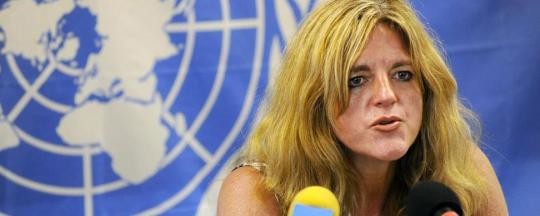The Special Representative of the UN Secretary General in South Sudan, Hilde Johnson, says that peacekeepers never gave refugee to ousted vice president Riek Machar or his family.
In the days after the crisis broke in mid-December, it was widely rumored that Machar took refuge at the UN base, or at a foreign embassy, or even at the house of Hilde Johnson, but later it emerged that he fled north to Jonglei.
Machar’s residence was attacked on the third day of the crisis, 17 December, amid fighting in the Amarat neighborhood of Juba, resulting in the death of some of his bodyguards.
Johnson, who has been in charge of the UN Mission in South Sudan (UNMISS) since independence in 2011, affirmed in an interview with Al Jazeera yesterday that the mission did not give refuge to the opposition leader.
“We have not in any way supported or given refuge to Riek Machar or his family. In this context, these accusations and allegations are totally baseless and I have repeatedly refuted them,” she says in the interview.
But she does acknowledge that the mission protects ex-combatants if they lay down their weapons. Asked whether the UN has been harboring rebels or former soldiers at the camps, she says, “Firstly, UNMISS and the UN is guided by international humanitarian law. It is our obligation to protect civilians that are in need of protection but are fleeing for their lives whatever their circumstances are.”
She clarifies, “The minute people come to our gates – leaving uniforms, weapons if any are ex-combatants – they become civilians and under international humanitarian law, have the right to protection the minute they enter our gates.”
UNMISS is currently protecting about 67,000 people at its bases in various towns throughout South Sudan, about half of them in Juba. Most of the protected civilians are ethnic Nuers, the group targeted in killings in the capital from 15-18 December.
Johnson says she believes if these people leave the UN camps they will be killed: “We have no choice in situations like this than to give people protection. The alternative would be, in the situation they were in, that they would be killed. I think that’s clear to most of the South Sudanese in this country.”
The peacekeepers call the civilian camps ‘protection of civilian sites’, often abbreviated to ‘PoCs’. The spokesman of UNMISS last week in an interview with Radio Tamazuj declined to say against whom the peacekeepers were protecting the civilians at the protection sites.
File photo: UN Special Representative Hilde Johnson (Tim McKulka/UN)




